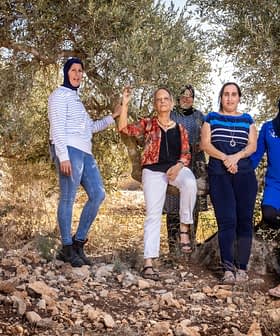Tourists of All Ages Are Heading to Groves and Mills This Summer
Whether it is dining in a grove, participating in the harvest or simply tasting oils, tourists are escaping the cities to spend summer holidays among olives.
 Tourists learn how extra virgin olive oil is produced at Petrini's mill..
Tourists learn how extra virgin olive oil is produced at Petrini's mill.. Olive oil-related tourism in Italy is growing substantially, with tourists increasingly interested in olive-related on-site experiences.
The farmer association Coldiretti estimated that in the summer of 2023, more than one-third of the tourism expenditures in Italy would go to restaurants, pizzerias, food fairs and farmhouses.
The difference we see in oleotourism when compared to traditional tourism is that people do not only want to be spectators. They want to take part in an experience.
A significant portion of the expected €15 billion food-related purchases will directly involve oleotourism and olive-related experiences.
According to recently published research from Roberta Garibaldi, president of the Italian Wine and Food Tourism Association, oleotourism is booming.
See Also:Umbrian Villages Steeped in Olive Oil Culture Promote New Tourism InitiativeGaribaldi’s research shows that 72 percent of those who intend to visit an olive mill plan to purchase a quality product reasonably priced.
That is 5 percent less than what was reported before the onset of the Covid-19 pandemic.
On the other hand, the research shows that up to 70 percent of tourists are now attracted by experiences of olive food pairings and opportunities for tasting olive oils accompanied by locally-produced food specialties.
According to the research, 59 percent of tourists are now interested in meeting and talking with the olive oil producers to learn more about their work, the tradition behind the product and the territory it comes from.
That is a 10 percent increase compared to 2019 “pre-Covid” data. “Before Covid-19, I was often asked around for talks about olive oil and olive oil tastings,” Francesca Petrini, an organic producer in the Marche region of central Italy and owner of Fattoria Petrini, told Olive Oil Times.
“Today, tourists and others reach out for this knowledge, they scour the area looking for these experiences. It is not me going out, it is them coming in,” she added.
“The difference between before and after the pandemic emergency is huge,” Petrini continued. “I think it has mainly to do with the fact that during that period, only limited touristic opportunities were allowed. So we all longed for open spaces to visit in small groups.”
Some in the sector believe that due to this confinement, a new trend was established based on quality, health and new opportunities.
According to Garibaldi’s observatory, oleotourism’s popularity is growing throughout Italy, especially in regions where local authorities have approved regulations to spur its growth. The Marche regional authorities have just approved one of their own.
Petrini, a professional olive oil taster and part of the official Marche regional panel, explained that many farm visitors ask how to directly contact the producer.
“Today, we are seeing a growing number of tourists reaching the farms and the mills with the goal of seeing how the olive oil production process unfolds, how the production chain works,” Petrini explained.
“Once they understand how the process works, what it implies and how it is done, it is for them much easier to understand the true value of olive oil,” Petrini said.
“When food tourists can directly see the production processes and see how food is produced with care and how much attention is given to recycling and reducing the environmental impact, they are then ready to taste a quality product and acknowledge its value,” Mauro Rosati, general director of the Qualivita Foundation, told Olive Oil Times.
The Petrini farm also organizes educational days, which allow visitors to understand the difference between quality extra virgin olive oil and the other olive oil grades.
Oleotourism
Oleotourism, also known as olive tourism or olive oil tourism, is a form of specialized tourism that focuses on the exploration, education, and promotion of olive oil production and its associated cultural heritage. It involves visiting olive groves, olive oil mills, and related facilities to learn about the cultivation, harvesting, processing, and tasting of olives and olive oil.
Oleotourism offers visitors an immersive experience in the world of olive oil, providing insights into the traditions, history, and techniques involved in olive oil production. Tourists can participate in various activities such as olive picking, olive oil tasting sessions, cooking classes that incorporate olive oil, and guided tours of olive oil mills.
The primary goal of oleotourism is to create awareness and appreciation for olive oil, its production process, and its significance in the local economy and culture. It aims to promote sustainable agricultural practices, support local farmers and producers, and highlight the health and culinary benefits of olive oil.
Oleotourism destinations are often located in regions known for their olive oil production, such as Mediterranean countries like Italy, Spain, Greece, and Turkey. However, the concept is not limited to these regions, and olive oil enthusiasts from around the world can explore and enjoy the unique experiences offered by oleotourism.
“That is a portion of our lessons. We also introduce tourists to the olive-rich history of our land, which is the heart of a century-old tradition of olive oil making in the Marche region,” Petrini noted.
Apart from tastings and food pairings, Petrini’s visitors are encouraged to visit the local olive museum and its 16th-century historic olive oil mill and participate in the other olive-related initiatives offered by the territory.
“The partnership among farms and farmhouses, private and public institutions and organizations is crucial for the development of oleotourism,” Petrini said. “Connecting the territories means to give value to the single projects as well as to the territories themselves, in terms of landscape, monumental and artistic heritage.”
“The difference we see in oleotourism when compared to traditional tourism is that people do not only want to be spectators. They want to take part in an experience,” she added. “They are looking to be enriched by that, to take home with them something of value such as new knowledge and new skills.”
Garibaldi’s research shows that 66 percent of tourists are also interested in exploring how olive farmers used to live and produce, visiting historical farmhouses and understanding the link between such rural life and olive oil production.
Walks through olive groves, exploring ancient mills and visiting olive museums constitute very attractive parts of the tourist experience, even more for tourists over 45 years of age.
Younger tourists are keenly interested in on-site experiences such as candlelight dinners in the olive groves and participating in the harvest.
“If we do this well, throughout the territories, with an educative approach, we can definitely recover a greater ability to promote the local excellencies and their unique characteristics,” Rosati concluded.










